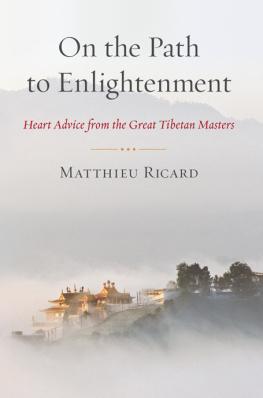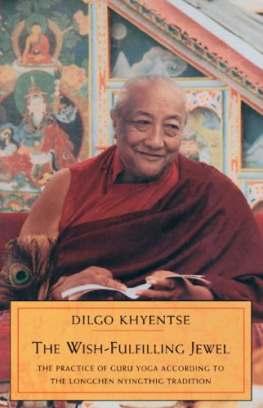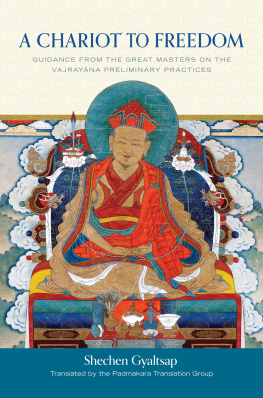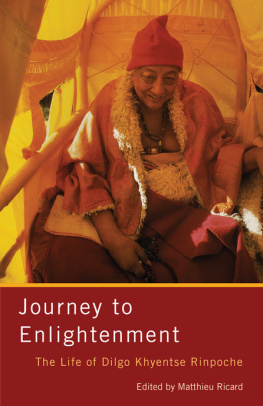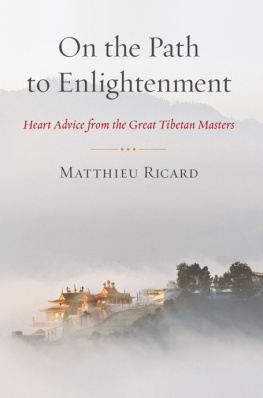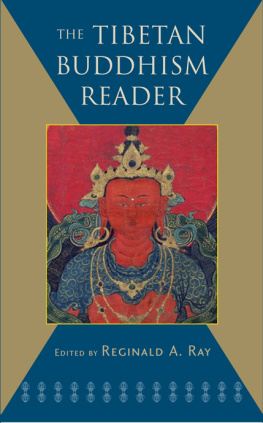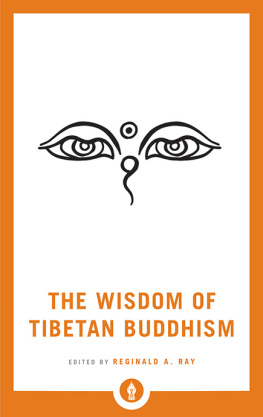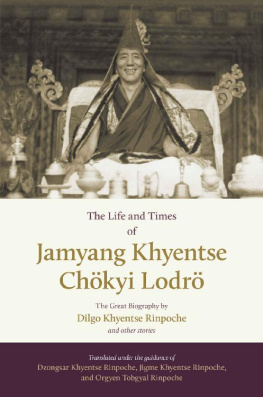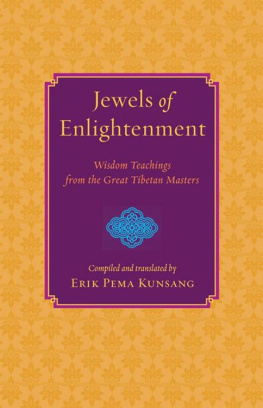ABOUT THE BOOK
Dilgo Khyentse Rinpoche inspired Matthieu Ricard to create this anthology by telling him that when we come to appreciate the depth of the view of the eight great traditions [of Tibetan Buddhism] and also see that they all lead to the same goal without contradicting each other, we think, Only ignorance can lead us to adopt a sectarian view. Ricard has selected and translated some of the most profound and inspiring teachings from across these traditions. The selected teachings are taken from the sources of the traditions, including the Buddha himself, Nagarjuna, Guru Rinpoche, Atisha, Shantideva, and Asanga; from great masters of the past, including Thogme Zangpo, the Fifth Dalai Lama, Milarepa, Longchenpa, and Sakya Pandita; and from contemporary masters, including the Fourteenth Dalai Lama and Mingyur Rinpoche. They address such topics as the nature of the mind; the foundations of taking refuge, generating altruistic compassion, acquiring merit, and following a teacher; view, meditation, and action; and how to remove obstacles and make progress on the path.
MATTHIEU RICARD is a former scientist who gave up that life to become a Tibetan Buddhist monk. He is the Dalai Lamas interpreter in French, has translated numerous Buddhist texts, and is the author of The Quantum and the Lotus, Journey to Enlightenment, and, with Jean-Franois Revel, The Monk and the Philosopher.
Sign up to receive weekly Tibetan Dharma teachings via e-mail.

Or visit us online to sign up at shambhala.com/edharmaquotes.
Translated from the Tibetan
with the collaboration of
CHRISTIAN BRUYAT
of the
Padmakara Translation
Group
English translation by
CHARLES HASTINGS
On the Path to
ENLIGHTENMENT
Heart Advice from the Great Tibetan Masters
MATTHIEU RICARD

Shambhala
BOSTON & LONDON
2013
Shambhala Publications, Inc.
Horticultural Hall
300 Massachusetts Avenue
Boston, Massachusetts 02115
www.shambhala.com
ENGLISH EDITION 2013 SHAMBHALA PUBLICATIONS, INC.
All rights reserved. No part of this book may be reproduced in any form or by any means, electronic or mechanical, including photocopying, recording, or by any information storage and retrieval system, without permission in writing from the publisher.
This is an abridged edition and English translation of
Chemins spirituels: Petit anthologie des plus beaux texts tibtains
NiL Editions, 2010, Paris.
Library of Congress Cataloging-in-Publication Data
Chemins spirituels. English. Selections
On the path to enlightenment: heart advice from the great Tibetan masters / Matthieu Ricard; translated from the Tibetan with the collaboration of Christian Bruyat of the Padmakara Translation Group; English translation by Charles Hastings.First Edition.
pages cm.
eISBN 978-0-8348-2853-7
ISBN 978-1-61180-039-5 (pbk.)
1. Spiritual lifeBuddhismQuotations, maxims, etc. 2. BuddhismTibet RegionQuotations, maxims, etc. I. Ricard, Matthieu, editor of compilation, translator, writer of added commentary. II. Title.
BQ7775.C49213 2013
294.3444dc23
2013000270
To Taklung Tsetrul, Pema Wangyal Rinpoche,
with great respect and gratitude
These few drops taken from the vast ocean of Tibetan Buddhist literature are not intended to be a definitive anthology. They are simply a compilation of the most inspiring texts that I have had the privilege to read over the years. I chose them for their clarity and for the authenticity of their authors.
I wanted the passages quoted in this book to represent as wide a range as possible of the different spiritual traditions of Tibet. On several occasions, I have drawn from sources that I found particularly clear and refreshing, especially those of the masters that I have had the good fortune to meet and who so perfectly represent traditions that have been preserved intact to this day. My choice has also included the words of the Buddha himself, as well as certain teachings of the great Indian Buddhist masters often quoted in Tibetan literature.
This is a small anthology since it does not pretend to be exhaustive, if only because of my limited knowledge. But I hope that, like a drop of honey, which, despite its small size, has all the flavor of the jar from which it is taken, this collection will contain the essence of the Buddhist path, especially in its most practical aspect, the use of every moment of existence to progress toward enlightenment.
In Bhutan in 1981, the great Tibetan spiritual master Dilgo Khyentse Rinpoche (191091) gave the transmission of the Treasury of Spiritual Instructions (Gdams ngag mdzod), which lasted for two months. In this thirteen-volume collection, Jamgn Kongtrul, one of the greatest masters of the nineteenth century, brought together the pith instructions of what are known as the Eight Great Chariots of the Accomplishment Lineage. The eight chariots are the main transmission lineages of Buddhist teachings that flourished in Tibet: Nyingma, Geluk-Kadam, Sakya, Kagyu, Shangpa Kagyu, Kalachakra, Orgyen Nyendrub, and Ch-Shiche (see the appendix for more on these lineages).
One evening, after the teachings, Khyentse Rinpoche said to me, When we come to appreciate the depth of the view of the eight great traditions and also see that they all lead to the same goal without contradicting each other, we think Only ignorance can lead us to adopt a sectarian attitude. So, to illustrate the words of Khyentse Rinpoche, I made the wish to translate a selection of texts from all of these schools. This little anthology is the modest fulfillment of that aspiration.
I translated many of the texts in the collection myself during the thirty-five years that I have spent in the East. Those from other sources are referenced in the sources section. Sometimes I went back to the Tibetan and modified the first translation.
According to tradition of the Padmakara Translation Group, of which I am a member, the translations were checked with the original Tibetan by another translator, in this case, my friend Christian Bruyat, who also modified the translation of many texts. While doing the English translation, Charles Hastings not only improved the flow of the presentation but again checked some important passages against the Tibetan original and made a number of improvements.
Preliminary versions of this anthology benefited from suggestions by Carisse Busquet, Madeleine Trhin, Yahne Le Toumelin, and other members of the Padmakara Translation Group.
We are very grateful to the Tsadra Foundation for its support to the Padmakara Translation Group for the revision of the French translation.
. Padmakara was founded over thirty years ago to translate the great texts of Tibetan Buddhist literature as accurately as possible and publish them so as to make them accessible to Western audiences.
What we call mind is a very curious phenomenon. Sometimes it is rigid and resistant to any change. It can also become very flexible as long as we make constant efforts to transform it and convince ourselves, through reflection, that this change is not only possible but essential. To do so, wishes or prayers are not enough. We need to use reason based on experience. One should not expect this transformation to happen overnight, as our old habits will resist any rapid solution.
HIS HOLINESS
THE FOURTEENTH DALAI LAMA
Contents
Buddhism is essentially a way of knowledge that leads to liberation from suffering. The awakening in which it culminates is both a wisdom based on an accurate understanding of reality and a freedom from the disturbing emotions and obscurations caused by ignorance. The practice of Buddhism does not require us to give up what is good in our life, but to abandon the causes of suffering, to which we are often attached to the point of addiction. So studying the Buddhist teachings does not mean overloading the mind with a lot of information. We just need to master the specific knowledge that will enable us to get free from samsara, the cycle of lives conditioned by ignorance and pain.
Next page
